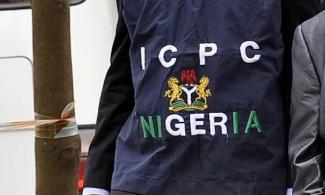
The ICPC Chairman, Prof Bolaji Owasanoye, stated this, adding that many of the regime's "prospective appointees" lacked credibility for their positions due to issues ranging from financial wrongdoing and drugs misuse to breaching code of conduct.
The Independent Corrupt Practices and other related offences Commission (ICPC), has said many of the appointees nominated by President Muhammadu Buhari’s regime are individuals of questionable character.
The ICPC Chairman, Prof Bolaji Owasanoye, stated this, adding that many of the regime's "prospective appointees" lacked credibility for their positions due to issues ranging from financial wrongdoing and drugs misuse to breaching code of conduct.
The chairman said this in Abuja at the “4th National Summit on Diminishing Corruption in the Public Sector” annual ceremony, Peoples Gazette reports.
He said, “As part of the efforts to sanitise the public service and upscale integrity, the commission has been collaborating with the OHCSF to flush out fake appointments and screen candidates for appointment to the position of permanent secretaries, amongst other initiatives.
“The findings thus far indicate that many prospective appointees are implicated in financial impropriety, corrupt practice, failure of code of conduct standards and substance abuse.”
He added that to decide proactive steps to enhance the budget process and distinguish between outright fraud and administrative errors, the commission met with various MDAs over periodic payroll surpluses in collaboration with the Budget Office and stakeholders.
He cited the ICPC's assessment of special funds intended to further education, such as the Universal Basic Education Commission and the Tertiary Education Trust Fund (TETFUND), as evidence of corruption in the field of education. This review exposed ongoing abuses, procurement norms violations, and statutory mandates compromises.
He continued by saying that a system assessment and review of SUBEB in six states from 2019 to 2020 showed that the governors' lack of commitment in failing to provide matching grants, among other defaults, thwarted the UBE law's goal to support states in improving basic education.
“The capacity and commitment of states and tertiary institutions to access UBE fund and TETFUND respectively as anticipated by law remain highly questionable,” said the ICPC chief. “In support of the government’s effort to improve revenue generation, the commission continues to investigate the diversion of tax and other statutory revenues as part of routine investigation and has recovered N1.264 billion this fiscal year,” he added.
To combat corruption in the educational sector, Owasanoye further stated that the anti-graft agency worked in conjunction with the National Universities Commission (NUC), National Board for Technical Education, and Joint Admission and Matriculation Board (JAMB).